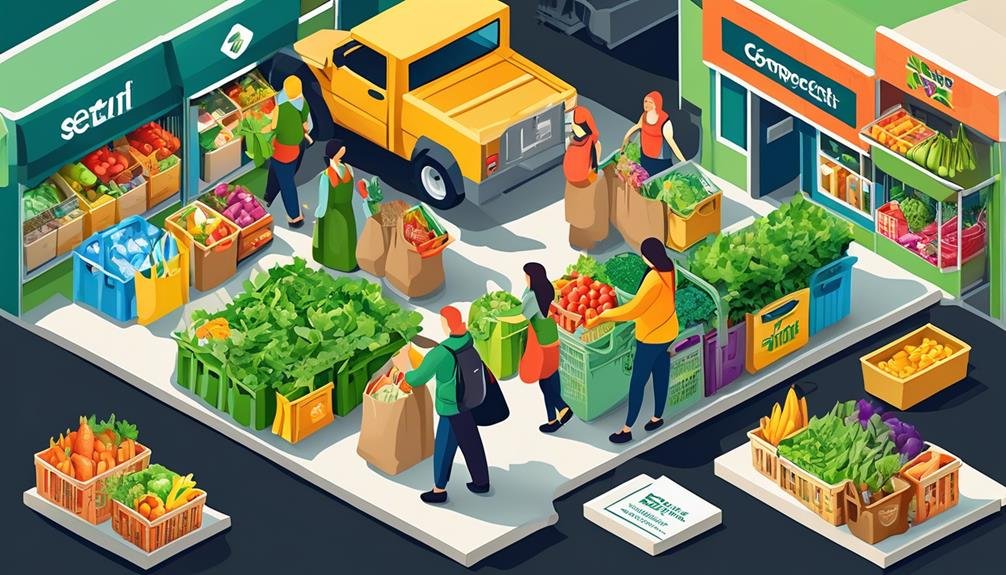Did you know that the average American produces about 4.4 pounds of trash per day? This staggering statistic highlights the urgent need for incorporating eco-friendly habits into our daily lives.
But where do you start? How can you make a meaningful impact without completely disrupting your routine?
In this discussion, we will explore the best ways to seamlessly integrate sustainable practices into your everyday life, helping you reduce your carbon footprint and contribute to a greener future.
So, if you're ready to take small but impactful steps towards a more eco-friendly lifestyle, keep reading to discover practical tips and strategies that you can easily implement.
Key Takeaways
- Switch to energy-efficient LED bulbs and turn off lights when not in use to conserve energy.
- Choose sustainable transportation options like carpooling, public transportation, or walking/biking to reduce carbon emissions.
- Reduce waste by using reusable bags and bottles, recycling, composting, and donating unwanted items.
- Conserve water by installing low-flow fixtures, minimizing water usage, fixing leaks, and reusing water when possible.
Reduce Energy Consumption
To lower your carbon footprint and save on electricity bills, start implementing energy-saving practices in your daily life.
One of the most effective ways to reduce energy consumption is by replacing traditional incandescent light bulbs with energy-efficient LED bulbs. LED bulbs use up to 80% less energy and last significantly longer than incandescent bulbs.
Additionally, remember to turn off lights when you leave a room and utilize natural light whenever possible.
Another way to reduce energy consumption is by adjusting the temperature in your home. Set your thermostat a few degrees lower in the winter and a few degrees higher in the summer to save energy. You can also use programmable thermostats to automatically adjust the temperature based on your schedule.
Furthermore, unplug electronics and appliances when they aren't in use to avoid standby power consumption.
Lastly, consider investing in energy-efficient appliances with an Energy Star label, which are designed to use less energy.
Adopt Sustainable Transportation Methods
Consider incorporating sustainable transportation methods into your daily routine for a greener and more eco-friendly lifestyle. By making a few simple changes, you can significantly reduce your carbon footprint and contribute to a healthier planet.
Here are some practical ways to adopt sustainable transportation methods:
- Carpool or Share Rides: Join a carpool or rideshare program to reduce the number of vehicles on the road. This not only decreases emissions but also saves you money on fuel and parking.
- Use Public Transportation: Utilize buses, trains, trams, or subways whenever possible. Public transportation isn't only cost-effective but also helps reduce congestion and air pollution in your community.
- Embrace Active Transportation: Walk or bike to nearby destinations instead of using a car. This not only cuts emissions but also improves your physical health and saves you money on transportation costs.
Minimize Waste Production

Reduce your waste production by implementing eco-friendly practices in your daily routine. One of the most effective ways to minimize waste is by practicing the 3R's: Reduce, Reuse, and Recycle. By following these principles, you can significantly decrease the amount of waste that ends up in landfills and contribute to a healthier environment.
To help you get started, here are some practical tips on how to incorporate eco-friendly habits into your daily life:
| Reduce | Reuse | Recycle | Compost | Donate |
|---|---|---|---|---|
| Use reusable bags and bottles instead of single-use plastics. | Repurpose items like glass jars and containers for storage. | Sort and recycle paper, plastic, glass, and metal waste. | Compost organic waste like food scraps and yard trimmings. | Donate unwanted clothes, furniture, and electronics to charities or thrift stores. |
| Opt for digital documents and emails instead of paper. | Repair or mend broken items instead of buying new ones. | Look for recycling programs in your community for e-waste and hazardous materials. | Use a compost bin or pile to turn organic waste into nutrient-rich soil. | Share or exchange items with friends or neighbors instead of throwing them away. |
| Buy products with minimal packaging or choose bulk options. | Use cloth towels or napkins instead of disposable paper products. | Purchase products made from recycled materials. | Support local farmers and buy organic produce. | Join community swap events to exchange goods with others. |
Practice Mindful Water Usage
Be mindful of your water usage to conserve this precious resource and protect the environment. Here are some practical tips to help you practice mindful water usage:
In the bathroom:
- Install low-flow showerheads and faucets to reduce water consumption without compromising your water pressure.
- Take shorter showers and turn off the water while brushing your teeth or shaving.
- Fix any leaks promptly to prevent water waste.
In the kitchen:
- Only run the dishwasher and washing machine when you have a full load.
- Use a basin to wash fruits and vegetables instead of letting the water run continuously.
- Reuse water from steaming or boiling vegetables to water your plants.
Choose Eco-Friendly Products

Make a positive impact on the environment by choosing eco-friendly products. By opting for products that are made from sustainable materials or have a minimal carbon footprint, you can reduce your environmental impact and contribute to a greener future.
When it comes to choosing eco-friendly products, one of the key factors to consider is the material composition. Look for products that are made from natural, renewable resources such as bamboo, organic cotton, or recycled materials. These materials require fewer resources to produce and have a lower impact on the environment compared to their conventional counterparts.
Another important aspect to consider is the packaging of the products. Opt for items that have minimal or recyclable packaging. Excessive packaging not only contributes to waste but also requires more resources for production and transportation.
Additionally, be mindful of the energy efficiency of the products you choose. Look for energy-saving labels or certifications, such as Energy Star, which indicate that the product meets strict energy efficiency standards.
Lastly, consider the lifespan and durability of the products. Investing in high-quality, long-lasting items not only reduces waste but also saves you money in the long run.
Support Local and Sustainable Businesses
To further enhance your eco-friendly habits, one impactful way is to support local and sustainable businesses. By choosing to patronize these establishments, you aren't only contributing to the local economy but also promoting environmentally responsible practices.
Here are a few reasons why supporting local and sustainable businesses is beneficial:
- Reduced carbon footprint: Local businesses typically source their products from nearby suppliers, reducing the need for long-distance transportation and associated carbon emissions. This helps to minimize the environmental impact of the goods and services you consume.
- Preserving local ecosystems: Sustainable businesses prioritize practices that minimize harm to the environment. They often implement measures to conserve energy, reduce waste, and protect natural resources. By supporting these businesses, you're indirectly contributing to the preservation of local ecosystems.
- Building community resilience: When you support local businesses, you help to create a stronger and more resilient community. These businesses often reinvest their profits back into the local economy, supporting local employment opportunities and fostering a sense of community pride.
Frequently Asked Questions
Is It Necessary to Completely Eliminate All Non-Eco-Friendly Habits From My Daily Life in Order to Make a Difference?
You don't have to eliminate all non-eco-friendly habits to make a difference. Small changes like recycling, conserving energy, and reducing waste can go a long way in incorporating eco-friendly habits into your daily life.
How Can I Encourage My Family and Friends to Adopt Eco-Friendly Habits as Well?
Encourage your family and friends to adopt eco-friendly habits by setting a positive example, explaining the benefits, and sharing practical tips. Small changes, like recycling or using reusable bags, can make a big difference.
Are There Any Government Initiatives or Programs That Can Help Me in Incorporating Eco-Friendly Habits Into My Daily Routine?
There are government initiatives and programs that can help you incorporate eco-friendly habits into your daily routine. Look into incentives, subsidies, and educational resources provided by your local authorities to make sustainable choices easier.
What Are Some Creative Ways to Repurpose or Recycle Items Instead of Just Throwing Them Away?
You can repurpose or recycle items instead of throwing them away by getting creative. Try turning old jars into storage containers, using old t-shirts as cleaning rags, or making art out of scrap paper.
How Can I Ensure That the Eco-Friendly Products I Purchase Are Actually Sustainable and Not Just Greenwashed?
Make sure the eco-friendly products you buy are truly sustainable, not just greenwashed. Research the company's practices, certifications, and ingredients. Look for transparency and third-party certifications like USDA Organic or Fair Trade to ensure their claims are legitimate.
Conclusion
Incorporating eco-friendly habits into your daily life isn't only important for the environment but also for your overall well-being. By reducing energy consumption, adopting sustainable transportation methods, minimizing waste production, practicing mindful water usage, choosing eco-friendly products, and supporting local and sustainable businesses, you can make a significant positive impact.
Small changes in your daily habits can go a long way in creating a more sustainable future for generations to come. Start making these simple changes today and be a part of the solution.







